Developer: Capcom Publisher: Capcom Release: 08/92 Genre: Action
I loved Magic Sword in the arcade but looking back I can see it for the massive money sink that it is. Arcade games were designed to drain as many quarters as possible but in this case the game went above and beyond in presenting a significant challenge. While I enjoyed every quarter I spent on Magic Sword I will admit the SNES port helped save me from going bankrupt at age eleven. Although it has been cut back in a number of ways the Super Nintendo version of Magic Sword is a solid port.
The dark lord Drokmar has come into possession of the Black Orb, an artifact that will give him the power to rule the world. As the Brave One it is up to you to scale the 51 floors of his Dragon’s Tower to put a stop to his plans.
The best way to describe Magic Sword is a more advanced version of Capcom’s Black Tiger minus the RPG elements. As the hero Alan you have nothing more than a sword and shield. Your attacks have a charge meter that once full will produce a different ranged attack depending on your current weapon. That is where the magic sword in the title comes from. As you defeat the many bosses in the tower you’ll receive more powerful swords, although outside the charged attack you won’t notice the difference.
While there isn’t an experience or shop system Magic Sword does have plenty of magic items. Some might even say too many. There are plenty of coins and baubles that award points. In addition to those there are various food items that restore health and numerous artifacts. These items grant bonuses such as increased attack power, faster recharge time, shields, etc. There are plenty of hostile items as well, like poison mushrooms that prevent you from attacking and trap treasure chests. The most common item are keys used to open cells and doors.
Unfortunately the SNES version of Magic Sword is missing two-player coop. But at least you aren’t going through the adventure alone. There are eight potential partners behind locked doors. Each partner is of a D & D class like thief, priest, ninja, and knight. Each character a separate life bar and will level up as you progress so long as you don’t switch. They also come with strengths and weaknesses. The Caveman is physically the strongest but has a short range. The Amazon is fast but has low attack power. The Priest is strong against undead and can protect himself with a barrier but has a long recharge time between attacks. One of the eight, the Lizardman, requires a special item to recruit but proves worth it. You can only have one partner but every level provides ample opportunity to switch if you so choose.
There are fifty floors in the Dragon Tower, which sounds like a lot, and it is. However Magic Sword is of medium length. Most floors are a straight path and last a scant minute or two. Some only provide a few chests before the exit and last thirty seconds. Like the arcade version you have the option to start at a number of set points, up to floor thirty-three. This cuts down the amount of time needed to complete the game and is incredibly generous. This is especially important as there is no battery backup or passwords to save progress.
The option to skip floors is also important as the game is very repetitive. Capcom did their best to keep things varied in the arcade and for the most part it worked. It is in that area that the SNES version suffers. A number of enemies have been cut, meaning you will face the same three or four enemies for most of the game. The number of enemies per stage has also been cut back and the sparseness of certain levels is instantly noticeable. It is admirable that they kept all fifty floors from the arcade but the game needed all of its content to avoid repetition. That hurts the game in addition to the missing multiplayer.
I mentioned the difficulty earlier and that carries over to the home port. Magic Sword was a stingy game in the arcade; you have two lives per quarter which is nothing. Here it is the same but you also only receive three credits to complete the game, a tall task. The game has cheap hits at every turn, from sudden enemy spawns to trap treasure chests. Life restoring food barely recovers any energy and isn’t common. The bosses are huge damage sponges with massive life bars, causing these fights to drag on. The home port could have used some balancing and the game suffers because of it.
In Closing
Even with its high difficulty and repetition I still had a lot of fun. Magic Sword suffers from reduced production values and heavy slowdown but I would still recommend it to those looking to fill out their SNES library.
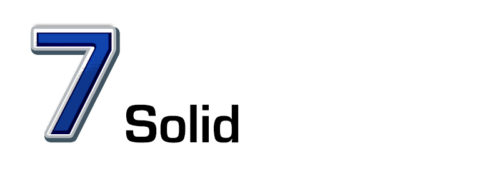

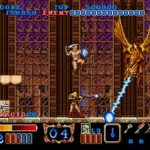
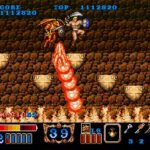
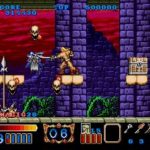
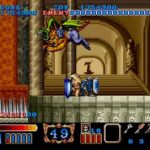
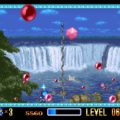
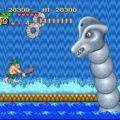
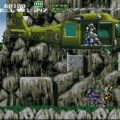
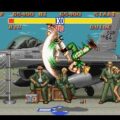
One thought on “Magic Sword”